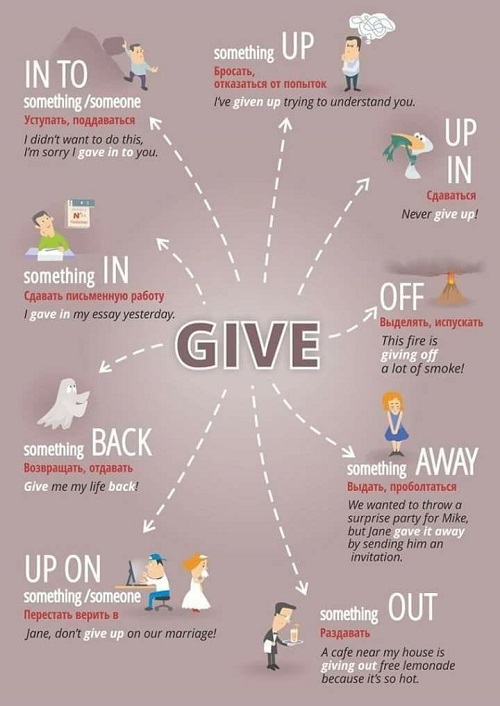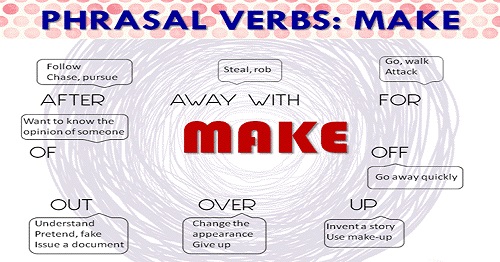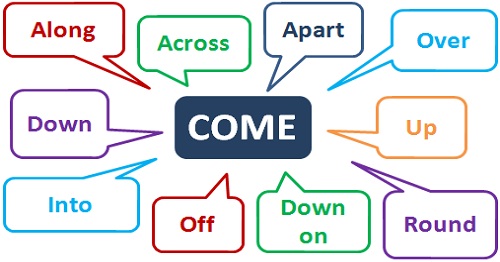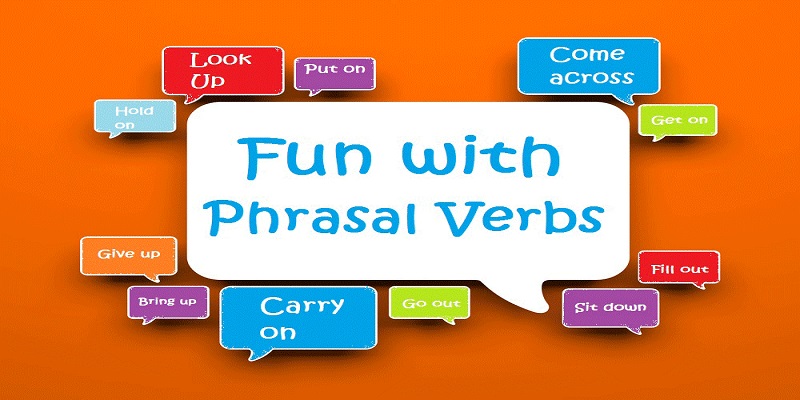اگر که در مراحل ابتدایی یادگیری زبان انگلیسی هستید، احتمالا با Phrasal Verb ها آشنا شده اید. Phrasal Verb ها در زبان انگلیسی بسیار فراوان هستند و در بسیاری از مواقع باعث گیجی و سردرگمی زبان آموزان میشوند. یکی از اصلی ترین مشکل استفاده از Phrasal Verb ها تعدادشان میباشد. زیرا تعداد این افعال بسیار فراوان بوده و کاربردشان بسیار گسترده و همچنین معنی هایشان گوناگون میباشد.ما در این مقاله به بررسی افعال عبارتی در زبان انگلیسی میپردازیم با ما همراه باشید.
فعل عبارتی چیست؟
فعل عبارتی ترکیبی از فعل و حرف اضافه است، یک فعل و یک قید، یا یک فعل هم با قید و هم با حرف اضافه. این افعال معمولا معنایی کاملا متفاوت با فعل اصلی دارند. افراد بومی از عبارات افعالی در جملات خود بسیار استفاده میکنند پس دانستن عمومی ترین آنها باعث ایجاد یک شگفتی در درک مطلب شما میشود. عبارات افعالی مانند یک راه میانبر هستند که صحبت های پیچیده را به جای جملات طولانی، در چند کلمه بیان میکنند.
بیشتر بخوانید: نکاتی درباره آموزش گرامر زبان انگلیسی
افعال عبارتی با فعل give

give awayè بخشیدن
“He’s a generous man. He gives away half of his salary to charity each month.”
give backè چیزی را به کسی پس دادن
“Can you give back that book I lent you?”
give inèفرو ریختن
“The floor gave in after the flood.”
give outèپخش کردن
“Can you give out these books to the rest of the class please?”
give upèواگذار کردن موقعیت و پوزیشن یک شخص به شخصی دیگر
“When I am on the bus, I rarely see anyone give up their seat to the elderly
افعال عبارتی با make در زبان انگلیسی

Make something upèداستان ساختن برای دروغ گفتن
“We all believed him when he said he’d been abducted by aliens, but apparently he made the whole thing up”.
Make up with somebodyèبخشیدن همدیگر و برگشتن به حالت دوستانه
“I’m glad to hear you and Steve have made up. There’ll be a much happier atmosphere in the office from now on!”
Make off with somethingèفرار با چیز های دزدیده شده
“Bank robbers have made off with over one million pounds after an audacious daylight raid.”
Make up for somethingè جبران کردن یک کار بد در حق کسی با یک کار خوب
“I’m taking Jean on holiday to Paris to make up for forgetting her birthday.”
افعال عبارتی با run

run intoèکسی را تصادفی دیدن
“I ran into an old friend of mine yesterday while I was out shopping.”
run out ofèتمام کردن
“We’ve run out of coffee again. Could you get some on your way home?”
run upèپرداخت کردن
“He ran up a huge bill at dinner.”
run away withèکسی را ترک کردن، از دست کسی فرار کردن
“His husband ran away with the secretary.”
run overèبا کسی تصادف کردن
“He’s still very upset after running over the cat last night.”
run throughèجمع بندی، خلاصه کردن
“OK, can we just run through the main points again?”
run onèتامین انرژی
“Those new cars run on electricity, but they are so expensive.”
run up againstèبا مشکل مواجه شدن
“The company ran up against some problems initially, but now things are operating smoothly.”
مرتبط بخوانید: منظور از قیدحالت در زبان انگلیسی چیست؟
افعال عبارتی با go

Go without somethingèانجام دادن کار بدون داشتن چیز مفید یا لازم
“I don’t mind going without air conditioning for a few days, but you really need to get the plumbing fixed in the bathroom.”
Go over somethingèبرای داشتن حس بهتر بعد از اتفاق ناخوشایند یا مریضی
“It took me a while to get over the break up. Even now, I still think of him sometimes.”
Go outèترک کردن خانه برای مراجعه به یک رویداد اجتماعی
“We used to go out to bars and restaurants all the time, but it all changes when you have children.”
Go out with somebodyèقرار رمانتیک با نامزد
“Are you going out with anyone at the moment? I’d love to take you for a meal sometime.”
افعال عبارتی با come

come acrossèتعجب کردن
“I came across that old watch of mine when I was cleaning out the drawers.”
come acrossè به نظر آمدن
“She comes across as a really confident person.”
come intoèبه دست آوردن
“John has been buying some flashy cars lately. He must have come into a bit of money.”
come up withèاختراع کردن، توسعه دادن، فکر کردن
“I’m finding it difficult to come up with new ideas.”
come up againstè با مشکلات مختلفی مواجه شدن
“We’ve come up against several political and legal problems.”
come down withèتسلیم بیماری یا ویروس شدن
“I don’t feel very well today. I think I’ve come down with the flu.”
come back to èبه خاطر آوردن
“I couldn’t remember her name, but after a few minutes it came back to me.”
افعال عبارتی با look

look intoè تحقیق کردن
“The police are looking into reports of a robbery last night.”
look up è دنبال اطلاعات خاصی گشتن
“Can you look up John’s phone number for me please?”
look forward toèاشتیاق داشتن
“I am looking forward to seeing my family again after six months of living abroad.”
look outè احتیاط کردن
“Look out, there’s a car coming!”
look after èمراقبت کردن
“Can you look after my cat while I’m away?”
look on è تماشا کردن
“The crowd looked on as the firemen tried to put out the fire.”
look up to è تحسین کردن، احترام گذاشتن
“She really looks up to her boss. He has taught her many things.”
